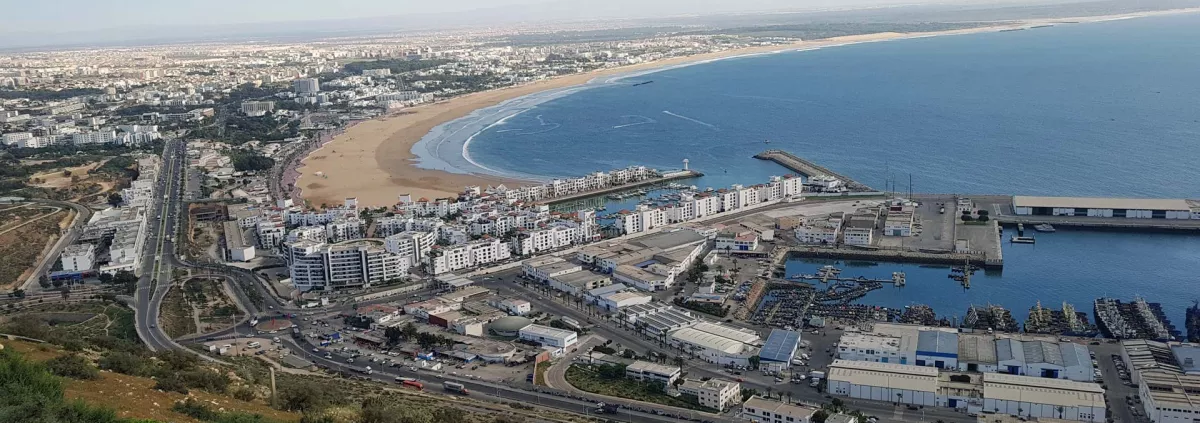Green economic transformation and climate-responsive urban development
Overview
Agadir municipality has pursued ambitious policies aimed at enhancing the quality of life of the city’s inhabitants, while protecting the environment and fostering sustainable development. The undertaken efforts targeted various key areas, in which the requirements and responsibilities for achieving environmental, social and economic sustainability were met.

Background
Agadir is one of Morocco's main urban centers and the capital of the province of Souss-Massa. The city is located on the western coast of the Atlantic Ocean with a population of around 421,000 and an area of 110 km2. Main sectors of its economy are agriculture, fishing, tourism and industry. Due to the convection that the local level plays an increasingly important role in mitigating climate change, the city has explored several approaches to optimize the use of local resources and to promote climate responsive urbanisation.
Objectives
The vision for the city of Agadir highlighted the importance of improving municipal services and quality of life and to rebuild Agadir as an eco-friendly smart city that promotes participatory methods, equal opportunities and gender equality. To achieve this vision, important progress was undertaken to establish an enabling institutional environment. This includes strengthening Agadir's role as an administrative, economic and touristic center while enhancing its cultural radiance, promoting investment and improving the business environment of the city.
Achieving these objectives was facilitated by the establishment of a local development company, which is responsible for overlooking the implementation of major development projects in the city in partnership with the competent local authorities.

Activities
- Waste management: several pilot projects were implemented to introduce sorting of waste at the household level. Furthermore, the municipality has distributed waste-sorting bins to more than 150 public and private schools in order to introduce the notion of waste sorting to school children. Another recycling initiative is the recycling of public street lights, which aims at the rehabilitation and reuse of old steel poles by the municipality of Agadir or making them available to neighboring towns. Moreover, waste management was improved by rehabilitating the old landfill and constructing a new landfill.
- Green spaces: a major project for the reuse of treated wastewater in the irrigation of green spaces and golf courses is ongoing. To optimize local resources, the city has introduced endemic plants in the urban plant procession that can adapt to the climatic conditions of the region. Furthermore, drip irrigation is being implemented in more than 80% of the green spaces of the city.
- Renewable energy: the city has been implementing the SolarCity program (2017-2022), which promotes the use of renewable energy sources in public buildings and pumping stations. The first tranche of the installation of a photovoltaic power station at the city hall has been operational for one year. Another power plant at Souk Al-had is ongoing. The objective is to mainstream the use of photovoltaics in public buildings and pumping stations for the irrigation of green spaces. Other actions prmoting energy efficiency in public lighting are undertaken by the city such as the implementation of an energy management system according to ISO 50001, mainstreaming the use of dual-power ballasts and lamps with high luminous efficiency, optimizing the public lighting network as well as achieving energy savings by setting up a remote management system.
- Public transportation: in addition to the development of the urban mobility plan (PDU) of Greater Agadir, the municipality of Agadir has developed its administrative mobility plan (PDA) which is the first municipal mobility plan at a national level. This project aims to improve public transport between the administrative centers and workplaces. It also aims to promote more sustainable staff mobility, thereby reducing air pollution while decreasing the cost and travel time.
- To monitor and evaluate the energy and climate benefits of the city's aforementioned activities, the municipality of Agadir has drawn up its reference inventory of greenhouse gas emissions (for the year 2013) which resulted in setting a benchmark of the energy-climate profile of the territory and identifying the sectors with highest emissions.
Effects
- The integrated energy reduction plan, which include the SolarCity project, resulted in an average 36% energy autonomy, while a 40% reduction was achieved due to the remote management system.
- In order to sustain the green areas and foliage cover in the city of Agadir that spread over 159.42 hectare, environmentally-conscious landscape planning was implemented. This focused on planting native drought-resistant plants and regular maintenance of the irrigation networks to minimize water loss. Furthermore, the treated greywater was used for irrigation of green areas in the city.
Conclusions
The city of Agadir has earned several awards and achievements due to the fulfillment of the requirements of national and international goals for sustainable development, as well as succeeding to integrate the environmental dimension into public projects that aim at transforming the city into an eco-friendly city. For example, the city of Agadir was selected as the environment-friendly capital of the Islamic world (2020-2021). The city was also granted Saudi Arabia's Award for Environmental Management in the Muslim World (2018-2019), and the " MENA Energy Award’ in 2016.
